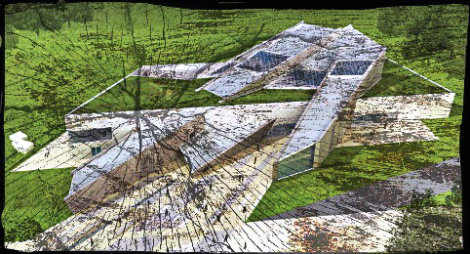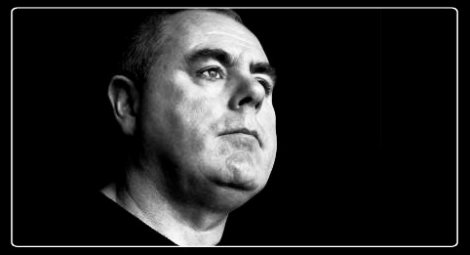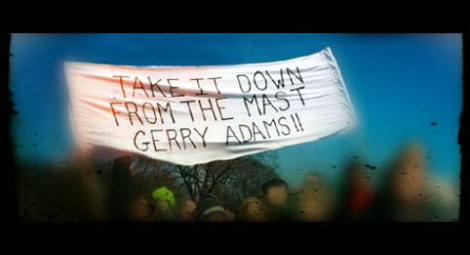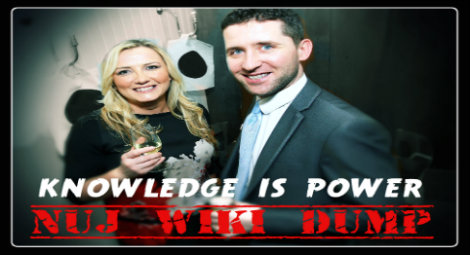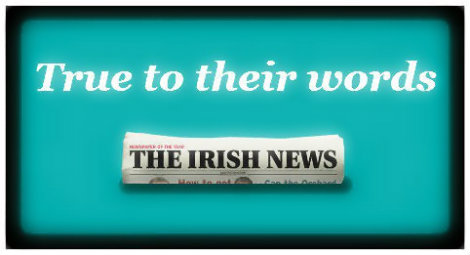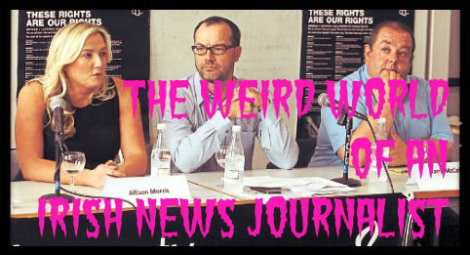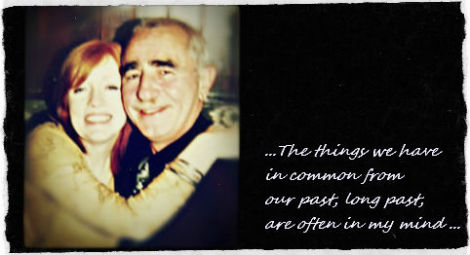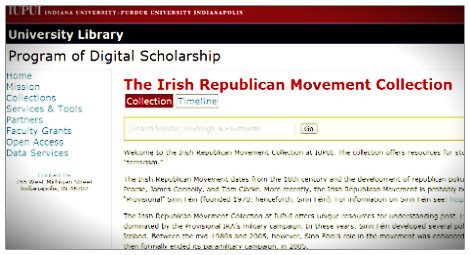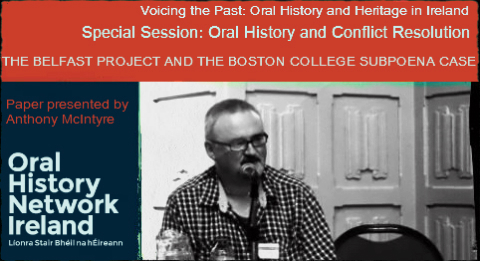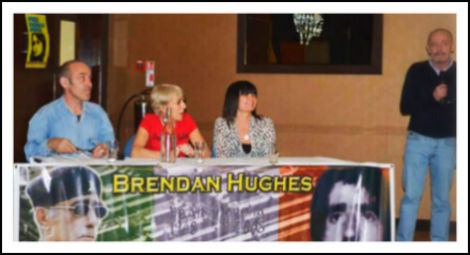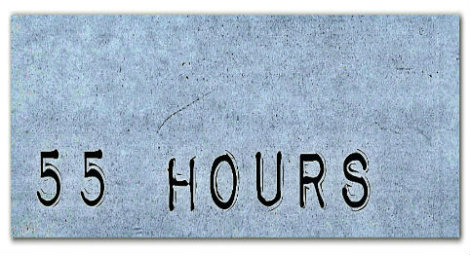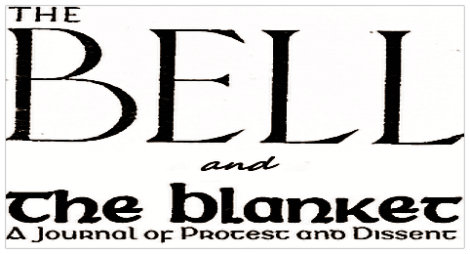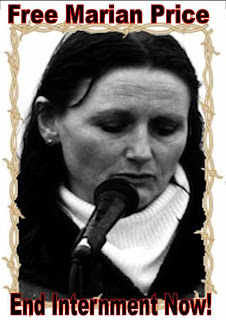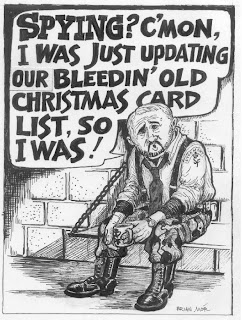TRANSCRIPT: Fran McNulty reports on further developments relating to the Boston College Belfast project
This Week
RTÉ Radio 1
Sunday 21 April 2013
Fran McNulty (FM) interviews journalist and former director of
The Belfast Project Ed Moloney (EM) about the status of the archive
presently under subpoena by the Police Service of Northern Ireland
(PSNI) in the wake of the US Supreme Court decision not to hear his
case. Host Gavin Jennings (GJ) provides interview framework.
Legend:
Sinn Féin President Gerry Adams (GA)
Male voice reading from US Senator Robert Menendez’ letter (MV)
Female voice reading responses from HET and PSNI (FV)
Boston College spokesperson Jack Dunn (JD)
The Belfast Project Lead Researcher Anthony McIntyre (AM)
Gavin Jennings (GJ): This week the US Supreme Court
rejected an appeal against a decision of a lower court to release
archived interviews with the now deceased IRA member Dolours Price.
Today this programme can reveal that much more information about the
disappearance and murder of Belfast mother Jean McConville than
initially thought is actually contained in the Boston College archive
where the Price interview is stored as part of the so-called Belfast
Project. Reporter
Fran McNulty has more.
Ed Moloney (EM): I have been able to share some of this with the American government. And I can tell you, Fran, when I tell them this particular set of
details, the people that I’ve had conversations with, who I then hope
will take this further up the chain in the American political system,
have immediately understood just how dangerous the contents of these
interviews can be.
Fran McNulty (FM): That’s Ed Moloney, the man who
oversaw The Belfast Project. This weekend he warns the institutions in
The North could fall such would Unionist reaction be to what Dolours
Price revealed in her archived interviews.
EM: The consequences of this for the peace process,
and I know there are lots of people in Ireland who are rubbing their
hands in glee at the anticipation of the fall of Gerry Adams over all of
this but with Gerry Adams will also fall the peace process and the
power-sharing government. There’s a very distinct possibility of that
happening.
FM: Is that not an overstatement?
EM: Not if you knew what was in the interviews and the impact that they will have and once they get out. And they will get out. They will get out I’d imagine reasonably
quickly. They will be leaked, and once they get into the political stew
in Northern Ireland there’s no removing them. They are stuck there and
the consequences will be there. There’s material there about the story
of one of these incidents that’s at the basis of the subpoenas. People think they know the full story. They don’t know the full story.
FM: But heretofore we’ve been told that the full
story was that Dolours Price didn’t tell interviewer Anthony McIntyre
anything about the murder of Jean McConville. That is true. But now we
do know that she did tell someone else. From his home in the United
States Ed Moloney has cast new light on the subject.
EM: What I have said all along is that in her
interviews with Anthony McIntyre as part of the Boston archive she did
not talk about Jean McConville.
FM: So if we restrict our comments to that
particular interview is what you’re saying that there are other people
speaking about the disappearance of Jean McConville?
EM: Or, the other possibility is that there are
maybe other Dolours Price interviews that were not part of the project
that happened to be deposited in the Boston archive.
FM: Are there?
EM: Well, that’s something which people can speculate on now, can’t they?
FM: Ed Moloney is holding back information as he’s entitled to. But this programme understands that an A to Z of what happened on the
night Jean McConville was disappeared from her home and murdered is
contained in the Boston College archive. The lengthy interview mentions
names and places and in it, Dolours Price refers to Gerry Adams. Before
her death she told a Belfast newspaper Gerry Adams was her Officer
Commanding in the IRA, something the Sinn Féin leader has consistently
denied. It’s a subject Mr. Adams has in fact spoken to this programme
about:
Gerry Adams (GA): Look, I’ve said it for years, for decades, I learned a long time ago not to worry about things you have no control over.
FM: Dolours Price’s interview in the archive is causing concern in the United States.
Male Voice (MV) reading Menendez letter:
Mr. Secretary, For over a year I have monitored the government of the
United Kingdom’s efforts to subpoena the documents and recordings of the
Boston College oral history project…
FM: The Chair of the Senate Foreign Relations Committee has written to the Secretary of State, John Kerry, on the issue.
MV: The United Kingdom’s request for material could
have the effect of re-opening fresh wounds and threatening the success
of the Good Friday Accords. Sincerely, Robert Menendez.
FM: Ed Moloney and Anthony McIntyre have been assisted greatly by Irish-America groups to lobby US politicians on this issue. But interestingly, Boston College is taking a similar approach. It is
trying to stop the release of further material beyond the Dolours Price
interviews – both legally and diplomatically. College spokesperson is
Jack Dunn:
Jack Dunn (JD): The Secretary of State of the United
States is John Kerry. John Kerry is a graduate of Boston College’s
School of Law. He knows our feelings on the matter. So we’ve worked
through diplomatic channels including the State Department and other
areas that I won’t get into specifics now. So it’s a two-pronged approach now. We are looking for a legal
resolution to the case through the court of appeals and we are also
looking for a resolution through various diplomatic channels.
FM: Mr. Kerry himself when he was Chairman of the
Senate Foreign Relations Committee wrote to the then Secretary of State
Hillary Clinton on the issue and expressed concern about the impact of
releasing (the) tapes. Would that give you any hope?
JD: We certainly hope so. He understands how
important this is. He was involved during the Clinton Administration in
helping to broker the Good Friday Agreement. So he understands
completely the importance of what’s at stake here. And our hope is that
he will use his influence to get the Police Service of Northern Ireland
to get law enforcement in Great Britain to work with the Department of
Justice to re-evaluate the need for these tapes to go through.
FM: The family of Jean McConville have insisted the
tapes should be released. They want those responsible for their mother’s
murder brought to justice. Anthony McIntyre interviewed numerous people
who were involved in The Troubles for the ill-fated archive. He, too,
can see The McConville’s point of view.
Anthony McIntyre (AM): If I was in the position of
the McConville Family I would probably be doing the same. And I think
people would understand it that way. But there are wider issues at stake
here, wider ethical issues. I mean, the same could be applied to the … an
argument, for example, could be made that: should we torture suspects to
get the information that the McConville Family require? Well obviously
no, we can’t. There’s certain things that cannot be violated. And I
don’t think journalistic research, academic research should be violated
by these types of demands.
FM: With the US Supreme Court clearing the way for
the release of the Price tapes many now want to know what the next step
will be. We asked the Historical Enquiries Team in The North. Their
response was brief.
Female Voice (FV) reading PSNI statement: The PSNI are dealing with the issues you’ve asked about not the HET.
FM: So if the Historical Enquiries Team aren’t
interested in the interviews what will the PSNI’s next step be? Their
response to that questions was, too, very brief.
FV: We’re making plans to take possession of the material and proceed with our enquiries.
FM: The Dolours Price interviews will be handed over
unless there is high-level political intervention. And Ed Moloney isn’t
hopeful.
EM: I’m watching this situation from three thousand miles away and watching
Dáil debates and what’s said in Dáil debates etc
and I can see quite clearly that some of the leadership of the
political parties in the Dáil are rubbing their hands in anticipation
and glee at all of this stuff coming out to do down Gerry Adams. Well, I
can understand that. They’re under political pressure, they’re under
electoral pressure from Gerry Adams’ party. But so far the Irish government has had no contact with me at all.
Not one single Irish diplomat has rung me up and said:
Look, Ed, can we
have lunch and would you mind, like, telling us why you’re saying this
stuff? Not one has shown any interest at all.
FM: Should they?
EM: Well, don’t you think if you were the Irish
government and this thing is happening and that someone is saying these
interviews could have this potentially devastating impact on the peace
process that you invested so many years to create … you’d think you might
have a little curiosity about what’s being said?
GJ: Journalist Ed Moloney speaking to Fran McNulty
from his home the United States. Well in response, the Department of
Foreign Affairs here has told this programme that it would be
inappropriate for the Irish government to interfere or get involved in a
case which was before a court of law in a foreign country.













